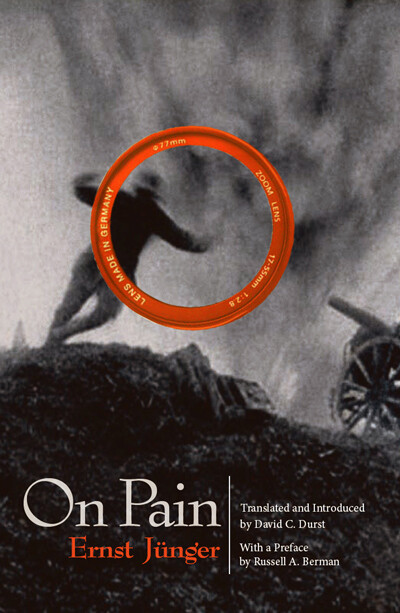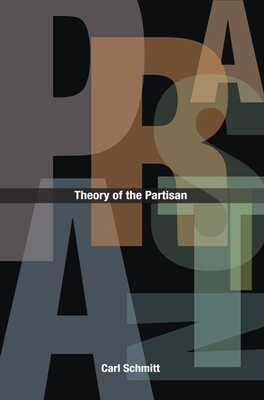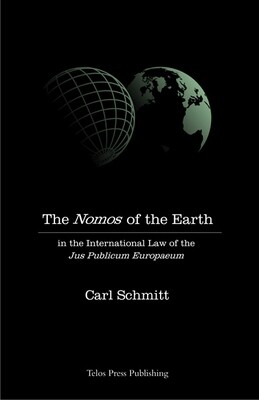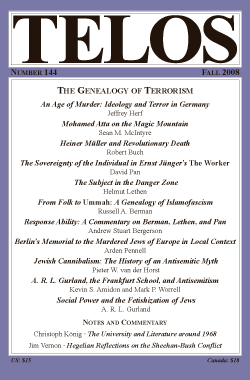On Pain (paperback)
On Pain
by Ernst Jünger
Translated and Introduced by David C. Durst
With a Preface by Russell A. Berman
Also available in Kindle eBook format at Amazon.com.
Written and published in 1934, a year after Hitler's rise to power in Germany, Ernst Jünger's On Pain is an astonishing essay that announces the rise of a new metaphysics of pain in a totalitarian age. One of the most controversial authors of twentieth-century Germany, Jünger rejects the liberal values of liberty, security, ease, and comfort, and seeks instead the measure of man in the capacity to withstand pain and sacrifice. Jünger heralds the rise of a breed of men who—equipped with an unmatched ability to treat themselves and others in a cold and detached way—become one with new, terrorizing machines of death and destruction in human-guided torpedoes and manned airborne missiles, and whose "peculiarly cruel way of seeing," resembling the insensitive lens of a camera, anticipates the horrors of World War II. With a preface by Russell A. Berman and an introduction by translator David C. Durst, this remarkable essay not only provides valuable insights into the cult of courage and death in Nazi Germany, but also throws light on the ideology of terrorism today.
About the Author
Ernst Jünger (1895–1998) was born in Heidelberg. He served in the German Army during World War I. Jünger's war memoir, Storm of Steel, offers a gripping account of his experiences. He was an outspoken conservative critic of the Weimar Republic. In 1939, Jünger's novel On the Marble Cliffs provided an allegorical critique of Hitler's regime. One of the most controversial writers of twentieth-century Germany, Jünger received many literary prizes. He died at the age of 102.
Praise for On Pain
"For those who study the Weimar period in German history, Ernst Jünger is well known as a war memoirist. Yet his political writings during those tumultuous years were equally important, and few have been translated into English. With this superbly introduced and meticulously translated edition of On Pain, scholars will have access to a key Jünger text, which demonstrates his uncanny ability not only to analyze the ruptures and crises brought about by modernity in his day, but also to anticipate world-historical phenomena that critical social theory still grapples with in the twenty-first century."
—Elliot Neaman, Professor of History, University of San Francisco, and author of A Dubious Past: Ernst Jünger and the Politics of Literature after Nazism
“Jünger represents a way of thinking about those things we fear the most. . . . This excellent translation introduces readers to a work of primary importance that will open a new perspective on human experience to all who read it in this volume.”
—Marcus Bullock, Professor Emeritus of English, The University of Wisconsin, Milwaukee, and author of The Violent Eye: Ernst Jünger's Visions and Revisions on the European Right
"Ever since the publication in Germany of his Storm of Steel (1920), Ernst Jünger has remained one of the most influential figures in conservative and revolutionary thought. However, until Telos Press's newly translated edition of Jünger's On Pain, there has been no clear-cut introduction to this, his vital critique of social liberalism and the culture of modernity, for scholars of literary, military, and intellectual history. Important yet contentious, On Pain offers a perfect entry point for readers unfamiliar with Jünger the political essayist, focusing upon such issues and ideas as torture and terror, horror and affliction. Russell A. Berman's comprehensive Preface and translator David C. Durst's contextual Introduction also introduce the contemporary significance of Jünger's encounter with pain."
—John Armitage, Principal Lecturer of Media & Communication, Northumbria University, United Kingdom, and Founder and Co-Editor of Cultural Politics
"In On Pain, Ernst Jünger shifts a codeword of modern subjectivity, derived from Nietzsche and Baudelaire, into the realm of phenomenological objectivity. His 'pain'—which he experienced in the storms of steel of the First World War—no longer emphasizes the liberal gesture of 'me, me,' but rather its opposite: the affirmation of the anonymous condition of the soldier in modern war and the worker in industrial production. The key is that traditional humanism is superseded by detachment as a heroic ethos. Unique insight into the cruel phenomena of the twentieth century and pre-fascist impulses coalesce in a gaze both analytic and fantastic."
—Karl Heinz Bohrer, Professor of Aesthetics and European Literature, University of Bielefeld
Paperback · 96pp
ISBN: 978-0-914386-40-7
Pub. Date: September 1, 2008







